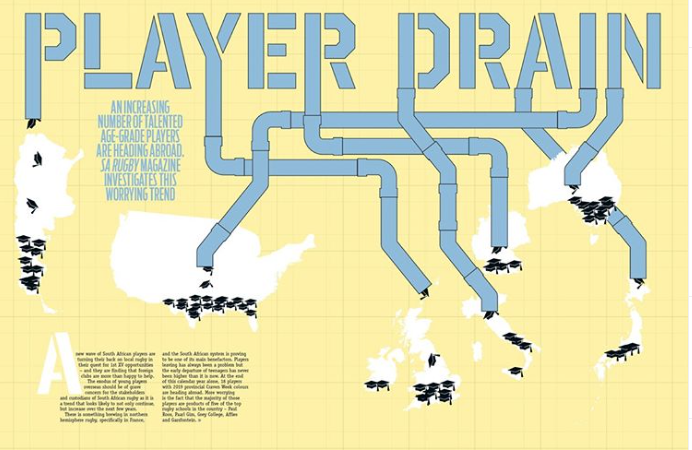An increasing number of talented age-grade players are heading abroad. MARIETTE ADAMS investigates this worrying trend.
A new wave of South African players are turning their back on local rugby in their quest for 1st XV opportunities – and they are finding that foreign clubs are more than happy to help.
The exodus of young players overseas should be of grave concern for the stakeholders and custodians of South African rugby as it is a trend that looks likely to not only continue, but increase over the next few years.
There is something brewing in northern hemisphere rugby, specifically in France, and the South African system is proving to be one of its main benefactors. Players leaving has always been a problem but the early departure of teenagers has never been higher than it is now. At the end of this calendar year alone, 18 players with 2019 provincial Craven Week colours are heading abroad. More worrying is the fact that the majority of those players are products of five of the top rugby schools in the country – Paul Roos, Paarl Gim, Grey College, Affies and Garsfontein.
There are a great number of reasons for this trend, but none more so than the lure of financial stability. The introduction of SA Rugby’s new contracting model, which essentially comes down to fewer player contracts across all 14 unions, and the fact that there will only be a week-long U19 tournament and a junior interprovincial U21 competition but no U20 tournament, are all without a doubt influencing the players’ decision to leave the country.
‘Thousands of schoolboys play first-team rugby each year and if some of them opt to take the chance of pursuing a career overseas, that is their right. Predicting which of those boys will go on to play international rugby is not an exact science and the contracting clubs are taking a calculated risk,’ an SA Rugby spokesperson said.
‘Meanwhile, in South Africa, the following year thousands more boys will play 1st XV rugby and hundreds of them will go into club, varsity and provincial rugby. The best of them will be identified as players of national interest – potentially a number of years before they fulfil every schoolboy’s dream of playing for the Springboks.’
But while the governing body is prepared to take a win-some, lose-some stance, a source close to the union and staunch advocate of schools rugby admits to being perplexed by the situation that is unfolding.
Speaking on condition of anonymity, he told SA Rugby magazine: ‘It’s one of the more unusual situations at age-grade level. These kids know they are supremely talented, but they are also supremely impatient and stubborn. They don’t want to bide their time, they want instant success. There were people who tried to persuade them to stay, but to no avail. The big challenge for them now is to see if their personal development is going to be a priority at those overseas clubs.’
When the two SA Schools squads for the 2019 U18 International Series – comprising hosts South Africa, England, Wales, France and Argentina – were announced, there were a few glaring omissions, particularly those of Kade Wolhuter and FC du Plessis. Those two, from Paul Roos and Grey College respectively, had been the most consistently impressive flyhalves over the past couple of seasons.
However, their moves to France had been confirmed shortly before the team announcements. SA Rugby insisted they had selected players on merit only, branding those who missed out as merely unlucky.
In theory that is fair, but in practice that claim falls apart when considering Wolhuter and Du Plessis’ unrivalled talent in their age group. Anyone who has been following schools rugby can attest that these players are a cut above their peers.
‘Kade is a special talent who can go on to play at the highest level. Here we have a playmaker who seems to have all the required skills one wants from a pivot. He scored tries, created plenty for those around him with his vision for putting players into space, be it with short or long passes, and his kicks out of hand and at the posts are up there with the best of them,’ WP Craven Week assistant coach Clint van Rensburg said.
Celebrated former international referee Jonathan Kaplan echoed Van Rensburg’s sentiments: ‘He seems to make all the right decisions and makes it all look too easy, so for sure he is headed for the big stage in the next five years or so.’
In stark contradiction to the comment given to SA Rugby magazine about the best young players being identified and then kept in the system, just over 30 players were handed junior contracts by unions for 2020. Neither Wolhuter nor Du Plessis were among them.
The latter explains to SA Rugby magazine his reasons for leaving.
‘I didn’t get a contract in South Africa. There was no interest from any union, none. I know for sure that several U18 players had received offers from unions before Craven Week but I got nothing, so when two French clubs inquired about my services I had to weigh up my options.
‘What was I supposed to do?’ he asks. ‘I want to play rugby and when the only offers on the table for me were from foreign teams, did they expect me to turn them down? It doesn’t make sense. I feel it was unfair that I was deprived of the chance to play for my country, especially since some of the guys who were selected for SA Schools had also agreed deals to go overseas; they just didn’t disclose that information.’
When probed about potentially playing international rugby, Du Plessis admits he would like to represent France. ‘I’m 18 and if I stay at Toulon, I’d become eligible to play for France when I’m 23. That is still relatively young. I feel I have a better chance of earning a Test cap there than I could potentially get in South Africa.’
Wolhuter, who signed a three-year deal with Montpellier, was more diplomatic when he touched on the subject.
‘I’ve decided to join a club where I can gain experience. It was an offer I couldn’t refuse, one I feel I can go forward with. I wasn’t offered anything from my home union after they made an approach that led to nothing, but that’s not to say I won’t be returning home once my contract expires,’ he says.
‘Am I considering applying for French citizenship, which would mean possibly playing for the national team? No. A five-year waiting period for that scenario to play out isn’t something I’m contemplating. All I want to do over the next few years is ply my trade at a club that boasts world-class flyhalves who I admire.’
But they are not the only players heading abroad, and the lack of interest from SA Rugby and the unions is not solely to blame. The Badawi Legacy Scholarship Programme – a joint venture between Grey College and Montpellier – has contributed to the situation.
Apart from Du Plessis, there are five other Grey College pupils on their way to France, four of whom will link up at Montpellier. It is not surprising as there is an agreement between the school and Montpellier, whereby the super-rich club runs an academy in the far reaches of the Free State.
When this was set up in 2017, all parties involved vehemently denied any ulterior motives behind the sudden investment. However, it is becoming increasingly clear that the venture – which is allegedly the brainchild of Montpellier owner Mohed Altrad – came with terms and conditions beneficial to the club.
‘We are not obliged to send anyone to Montpellier yearly. These are all individual decisions as some of them were not approached by any South African unions,’ Bobby Joubert, Grey College’s director of rugby, tells SA Rugby magazine when asked if any of the France-bound Grey pupils will do so under the Badawi agreement.
Headmaster, Deon Scheepers, adds: ‘We live in a global village and it’s becoming increasingly difficult for traditional rugby schools to stay at the top. That is why people should accept this project for what it is: a fairytale story that will strengthen and improve rugby in the Free State, and an initiative that can be the blueprint for similar projects at local schools around the country.’
Of course, Grey’s alliance with Montpellier should not be frowned upon, neither should SA Rugby’s line of controversial decisions – which were rightfully made in its own best interests. However, denying your modus operandi only causes confusion, mistrust and suspicion.
Foreign clubs are already looking to South Africa – where short-term needs take increasing precedence over long-term thinking – as a market to be exploited. A little transparency will go a long way in explaining why they are so effortlessly allowed to raid what should be Springbok rugby’s exclusive production line.





